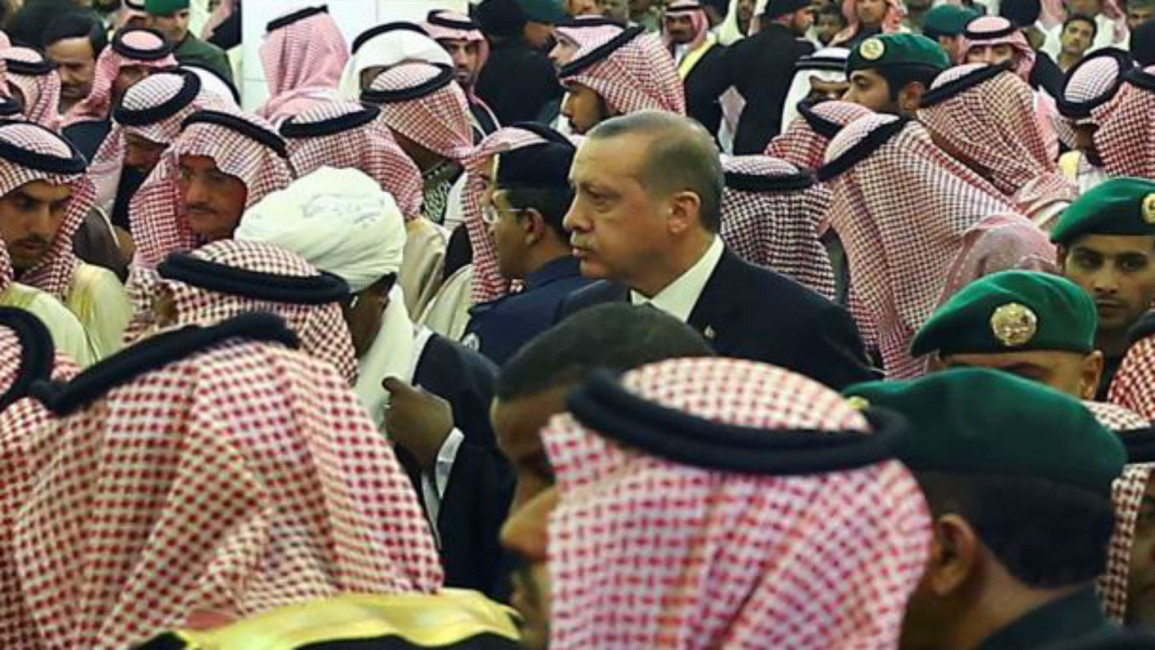
Riyadh and Ankara must explore their common interests
Riyadh and Ankara must explore their common interests
Comment: Turkey and Saudi Arabia share regional goals, but a few points of difference have driven a wedge between the two. It is in both their interests to overcome them.
3 min read
Erdogan attended Abdullah's funeral in Saudi Arabia [Anadolu]
When he was Crown Prince of Saudi Arabia, King Salman was in charge of Saudi-Turkish relations.
On his visit to Ankara in May 2013, he signed an agreement for industrial and defence cooperation with Turkey.
Relations between the two countries improved on all levels. Saudi investments in Turkey grew significantly, and Turkish companies became involved in large projects in Saudi Arabia. This cooperation was not limited to the economy, it also included security and defence.
| Daggers drawn in the House of Saud. Read more. |
Saudi-Turkish relations, however, hit the rocks over their differing positions on events in Egypt. Cooperation between the two countries, especially over military issues, was halted when Abdel Fatah el-Sisi, then-Egyptian defence minister, overthrew Mohamed Morsi's presidency.
Making an effort
Ankara's awareness of the importance of its relationship with Riyadh and the need to improve was demonstrated when the Turkish president, Recep Tayyip Erdogan, cut his Africa tour short and headed to Saudi Arabia to attend the funeral of King Abdullah last month. Analysts saw the declaration of a day of mourning as a Turkish attempt to improve relations.
| Cooperation halted when Abdel Fatah el-Sisi, then-Egyptian defence minister, overthrew Mohamed Morsi's presidency. |
Less than a week after Erdogan attended the funeral, Turkey sent the warship Buyukada to Jeddah's seaport to participate in military exercises with Red Sea countries.
According to the US-based Foreign Policy magazine, the new Saudi king prioritises relations with Ankara, as they have a direct bearing on many important issues in many countries.
Many analysts believe the recent changes in the leadership of Saudi Arabia are a reason for optimism that Riyadh's foreign policy will change, and a new page will be turned in Turkish-Saudi relations.
"Every era is led by different states and men, as well as foreign policies," Saudi political analyst Jamal Khashoggi said.
"We need a joint operations room between Saudi Arabia, the US and Turkey, to effect reconciliation and extinguish fires."
Khashoggi added that the two countries shared many interests, and that they could complement each other in many ways, serving the interests of the region as a whole.
He also said he considered Syria to be one of the most important points of cooperation between Ankara and Riyadh, as they both support the opposition against the regime in Damascus.
In addition, Khashoggi said cooperation between Turkey, Saudi Arabia and Qatar to support the opposition was countered by Iranian-Russian cooperation to support Assad.
The realpolitik
Turkey follows a course of realpolitik - it may not agree with a country's stance on certain issues, but it will seek to maintain relationships where it can. It is friendly with both Iran and Russia, despite the situation in Syria.
| Any cooperation between Turkey and Saudi Arabia could help Riyadh and Ankara counter Iranian influence in the region. |
Any cooperation between Turkey and Saudi Arabia could help Riyadh and Ankara counter Iranian influence in the region.
Ultimately, ending the suffering of the Syrian people depends on cooperation between Ankara and Riyadh.
Speaking on CBS' Face the Nation programme, the former US secretary of state, James Baker, asked why the Obama administration didn't cooperate with Turkey to bring Assad down and destroy the Islamic State group, as it would serve their common interests.
Baker said the US could supply the airpower, logistical support and intelligence, while Turkey could supply boots on the ground. He added that a Turkish invasion of Syria would be legitimate if Arab soldiers, especially from Saudi Arabia, the Emirates and Jordan, participated.
Opinions expressed in this article remain those of the author and do not necessarily reflect the opinions of al-Araby al-Jadeed, its editorial board or staff.
This is an edited translation from our Arabic edition.



